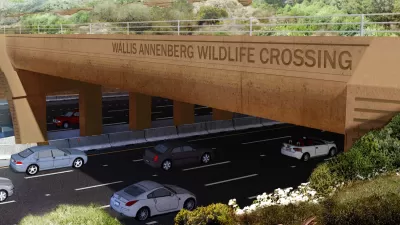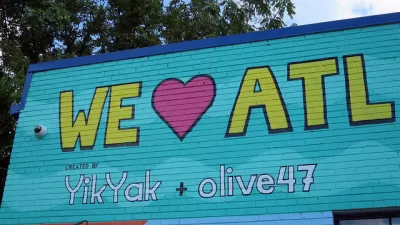Streetsblog USA shares an interview with the visionary behind the Atlanta BeltLine, who discusses how the city's booming economy has conflicted with the mission of the project.

Angie Schmitt spoke with Ryan Gravel following his high-profile resignation from the board of the Atlanta BeltLine Partnership.
As explained by Schmitt, Gravel laid out the vision of the BeltLine, to "[transform] forgotten railroad tracks circling the city of Atlanta into a recreational and active transportation corridor," and helped the idea gain political and financial support as well as attract the admiration of observers all over the country. Thus, Gravel's resignation was a big deal, and Schmitt's interview provides a chance to clear the air and sound an alarm about the pressing concerns that caused Gravel to act.
Here, Gravel explains in his own words why issues of equity and gentrification have become central in the conversation about the BeltLine:
It’s just become clear with the economy roaring back and the population in the city growing quite a lot, and projected to grow quite a lot, if we want to live up to the promise of the BeltLine we need to get more aggressive on [housing] affordability.
According to Gravel, the mission of the BeltLine partnership has come to be defined by a tension between "the need to raise money for the project and the need to leverage some of the community’s passion for the project to achieve political pressure to achieve its outcomes."
Gravel also suggests some future actions to help solve the problems he's encountered, such as loosening development regulations for housing and having a more public dialogue. Gravel also concludes by hinting at his next steps, which could include a new organization.
FULL STORY: Atlanta BeltLine Visionary Speaks Out on His Very Public Resignation

Pennsylvania Mall Conversion Bill Passes House
If passed, the bill would promote the adaptive reuse of defunct commercial buildings.

World's Largest Wildlife Overpass In the Works in Los Angeles County
Caltrans will soon close half of the 101 Freeway in order to continue construction of the Wallis Annenberg Wildlife Crossing near Agoura Hills in Los Angeles County.

U.S. Supreme Court: California's Impact Fees May Violate Takings Clause
A California property owner took El Dorado County to state court after paying a traffic impact fee he felt was exorbitant. He lost in trial court, appellate court, and the California Supreme Court denied review. Then the U.S. Supreme Court acted.

California Grid Runs on 100% Renewable Energy for Over 9 Hours
The state’s energy grid was entirely powered by clean energy for some portion of the day on 37 out of the last 45 days.

New Forecasting Tool Aims to Reduce Heat-Related Deaths
Two federal agencies launched a new, easy-to-use, color-coded heat warning system that combines meteorological and medical risk factors.

AI Traffic Management Comes to Dallas-Fort Worth
Several Texas cities are using an AI-powered platform called NoTraffic to help manage traffic signals to increase safety and improve traffic flow.
City of Costa Mesa
Licking County
Barrett Planning Group LLC
HUD's Office of Policy Development and Research
Mpact Transit + Community
HUD's Office of Policy Development and Research
Tufts University, Department of Urban and Environmental Policy & Planning
City of Universal City TX
ULI Northwest Arkansas
Urban Design for Planners 1: Software Tools
This six-course series explores essential urban design concepts using open source software and equips planners with the tools they need to participate fully in the urban design process.
Planning for Universal Design
Learn the tools for implementing Universal Design in planning regulations.


























